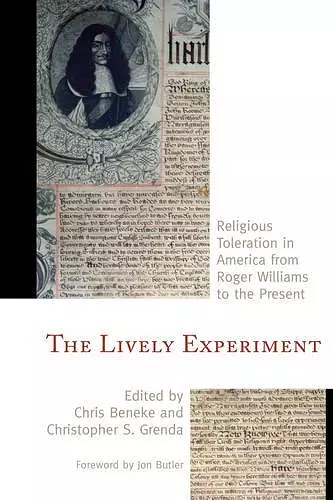The Lively Experiment
Religious Toleration in America from Roger Williams to the Present
Christopher S Grenda editor Chris Beneke editor
Format:Paperback
Publisher:Rowman & Littlefield
Published:23rd Dec '16
Currently unavailable, and unfortunately no date known when it will be back
This paperback is available in another edition too:
- Hardback£77.00(9781442248724)

Three hundred and fifty years ago, Roger Williams launched one of the world’s first great experiments in religious toleration. Insisting that religion be separated from civil power, he founded Rhode Island, a colony that welcomed people of many faiths. Though stark forms of intolerance persisted, Williams’ commitments to faith and liberty of conscience came to define the nation and its conception of itself. Through crisp essays that show how Americans demolished old prejudices while inventing new ones, The Lively Experiment offers a comprehensive account of America’s boisterous history of interreligious relations.
The line from religious intolerance to religious tolerance to pluralism was not straight and uncomplicated. This outstanding anthology, born out of a conference celebrating the 350th anniversary of Rhode Island’s 1663 charter, provides a plethora of case studies from the Colonial era (with especially good analyses of Roger Williams, William Penn, and the Methodist relationship to slavery in the Caribbean) and the 19th century. Contributors also provide contemporary stories of ‘Mormon moments,’ the movement against ‘cults’ in the 1970s, and the liberal effort to push the religious right off the air using the Fairness Doctrine as a weapon. What is clear throughout is how much toleration has been hard for people to tolerate. ‘What people do with their religious liberty can seem downright appalling to others,’ the editors note, and the essays are full of such examples. The Rhode Island context results in multiple discussions of the complexities of Roger Williams, whose emphasis on both liberty and proselytization helps explain the ‘American polity’s unique and somewhat paradoxical combination of religious disestablishment and a religiously charged public sphere.’ Top-notch scholarship on a topic of great contemporary importance. Summing Up: Essential. All levels/libraries. * CHOICE *
The Lively Experiment’s value is its examination of an issue that is both historical and contemporary, providing readers with new perspectives on the evolution of religious toleration. * Journal of American History *
This collection advances our knowledge of U.S. religious liberty history in a lively way. * Voice of Reason *
Chris Beneke and Christopher S. Grenda are among the best students of religious liberty and church-state relations in early America. In The Lively Experiment, they have put together a fine collection of essays on religious toleration in America from the early colonies to the present day. This volume should be read by anyone interested in the development of religious liberty in the United States. -- Mark Hall, George Fox University
Collectively, the essays in The Lively Experiment forcefully underline why the experiment of constructing religious freedom in a liberal polity has been so lively: the practice of toleration is a constantly negotiated process, not a preordained outcome. -- Charles L. Cohen, University of Wisconsin–Madison
The essays in this volume challenge us to understand that “religious toleration” and “religious liberty” are not one and the same. Toleration is sometimes painful and rarely, if ever easy. Liberty may be “inalienable,” but the question of whether it is communal—held by groups and not just individuals—vexes us even today. The Lively Experiment is an ambitious exploration of a complicated commitment that lies at the heart of American identity. -- Maura Jane Farrelly, Brandeis University
Through a rich array of case studies, this smart and timely collection explores the contradictions of religious tolerance in America. From complications derived from interpreting Roger Williams' demand for religious freedom to the paradoxes of modern ecumenism, the volume moves beyond arguments for religious pluralism to examine the complicated history of religious tolerance, and the tendency among champions of religious tolerance to uphold new forms of intolerance. -- Amanda Porterfield, Florida State University
The case studies of religious toleration gathered here offer an illuminating introduction to the historical vagaries of this contested ideal. Rather than proposing a linear narrative of progress, they shed light on the complex ambiguities and tensions endemic to how Americans have tried to put the abstract principle of toleration into practice. -- Isaac Weiner, The Ohio State University
This terrific set of essays is full of compelling new insights into the history of religious toleration and religious freedom in America. Moving well beyond any simple narrative of progress, these authors help us understand the many complications and dilemmas of America’s ongoing debate around the meaning and limits of religious freedom. -- Tisa Wenger, Yale Divinity School
- Winner of Choice's Outstanding Academic Titles Top 25 Books for 2015.
ISBN: 9781538101704
Dimensions: 231mm x 152mm x 25mm
Weight: 531g
358 pages